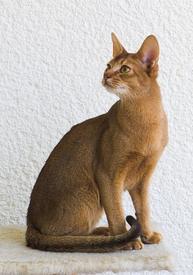
Despite being one of the most commonly recognised breeds of domestic cat in the world, precious little is known about its origin. Some people speculate that the Abyssinian is descended from the earliest cats of Egypt around 4,000 years ago, whereas others believe the cat was taken from Abyssinia, what is now Ethiopia, by British soldiers following the Abyssinian War in 1868. There is evidence to support both theories, with depictions of cats similar to modern Abyssinians appearing in Ancient Egyptian artwork, and genetic evidence pinpoints its early existence along the coast of the Indian Ocean; historically, it was here that colonists gathered and traded wild animals, making it highly plausible for British soldiers to have acquired these cats. Developed in Great Britain from the late 1800s, the Abyssinian was soon imported to America where it remains one of the country’s favoured breeds.
Graceful and athletic in appearance, the Abyssinian is a pleasant-looking breed with expressive features. A short-haired cat that is commonly coloured cinnamon, fawn, chocolate, blue and lilac, the breed is generally low-maintenance and only a moderate shedder, needing infrequent grooming. Typically the ears are large and arch over, and the eyes are seen in amber, green or gold, usually surrounded by a dark ring. The breed’s characteristically long legs give the Abyssinian its nimble appearance. The Somali cat is the long-haired variation of the Abyssinian, boasting a profuse coat, usually with colour ticking, and a tail that is often described as ‘fox-like.’
Typically active and inquisitive, the Abyssinian thrives best when allowed to freely roam the great outdoors. Not a natural lap cat, this breed is highly vigilant and can often be found observing the goings-on in the home. Despite its intelligence and independence, an Abyssinian enjoys the company of its humans and will interact with them comfortably. The breed is also highly compatible with other house pets including dogs, and will respond playfully towards them. In general, a healthy Abyssinian will weigh between 6-10 pounds depending on its gender. Abyssinians can live up to 15 years.
Typically healthy and resilient, the breed is prone to few health complaints. A genetic condition called Pyruvate Kinase Deficiency, caused by a recessive gene, is commonly observed in the Abyssinian and is often characterised by jaundice, lethargy, an enlarged abdomen and pale gums. Not all affected cats will display these symptoms however, so it is helpful to get your cat tested as early as possible, though bearing in mind the condition can strike at any time, whether your cat is six months old, or twelve years.
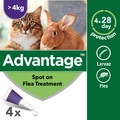
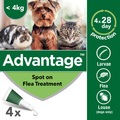
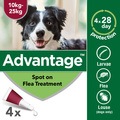
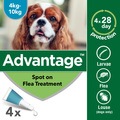
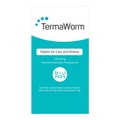
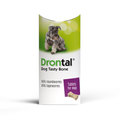

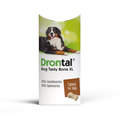

VetMedsDirect has been working alongside VioVet to bring you a wider range of products, including prescription medications. VetMedsDirect has been owned and run by VioVet since 2015, and has been operating since then from the same premises in Luton, Bedfordshire.
VetMedsDirect has now been fully merged with VioVet. If you had an account with VetMedsDirect you can securely login with your same details on the VioVet website and there will be no delay or disruption to the supply of your pet products.
Thank you for being a VetMedsDirect customer, we are confident that you will be just as satisfied with what VioVet can offer you and your pets!
If you'd like more information about the company merge, you can read more on our blog.
Love my boy. He is only ten months. He is an out door cat but is equally happy in the house particularly when it rains. He absolutely loves the dogs and will happily come for a walk with us. Not a particular lap cat will happily sit for 10 mins and then he's off catch things. Have to love his independent streak.